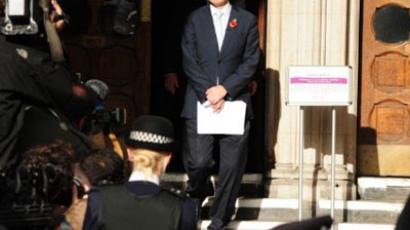Assange granted Supreme Court appeal
Julian Assange has been granted an appeal to the UK Supreme Court to halt his extradition to Sweden over sex crimes allegations. If the appeal had been denied the WikiLeaks founder would have been en route to Stockholm within 10 days.
Assange himself says he is thankful for this opportunity, and “the long struggle for justice for him and others continues.”“The issue of extradition safeguards is a concern to many people. There are many aggrieved families in the UK and in other countries in Europe that are struggling for justice,” Julian Assange said. “This afternoon the parliament of the United Kingdom is considering in depth the matters that arise from various extradition cases in the UK, including my own. Today the High Court has decided that an issue that arises from my own case is of general public importance and may be of assistance to other cases and should be heard by the Supreme Court. I think that is a correct decision and I am thankful.”As for now, the team of his lawyers has 14 days to petition the Supreme Court for appeal, RT’s Laura Smith reports from London. Should it be unsuccessful, they can still turn to the European Court of Human Rights.One of Assange's lawyers, Gareth Pierce, says the judges have accepted his argument that police and prosecutors may not have the power to issue extradition requests under European law as they are not judicial authorities.For Assange, the latest developments mean that his stay in Britain — where he lives under house arrest at an affluent supporter's rural mansion — is likely to last for many more months.The 40-year-old Australian whistleblower has spent almost a year on bail in Britain fighting extradition and previously both courts he has appeared in have ruled against him.In order for his case to be forwarded to the Supreme Court of Britain, Assange’s lawyers had to persuade two High Court judges that the case raises a question of “general public importance”. His lawyers have argued that he cannot be extradited as the European arrest warrant is invalid, having been issued by the incorrect authority, and because he has not been charged with any crime. Assange's hearing on Monday came on the same day as a parliamentary debate on Britain's extradition rules. The House of Commons debate will be based upon demands to change controversial extradition agreements.Earlier on Sunday, Assange told AP that he was heartened that lawmakers are tackling the issue of extraditions, saying that all people ask for is “the right to not be shipped off to foreign lands without formal charges or the presentation of even the most basic evidence."
Assange had been accused by two women he was involved with during a visit to Sweden in August 2010. One of them accused him of coercion and molestation, the other alleged that he had sex with her as she slept. This happened shortly after WikiLeaks released secret US files regarding the wars in Iraq and Afghanistan.Although Assange has not been charged by Swedish prosecutors with any crime, they demand that he return to Scandinavia for questioning. Assange denies all accusations, saying the sex was consensual and the investigation is politically-motivated by US officials and other governments angry about their secrets being leaked.














